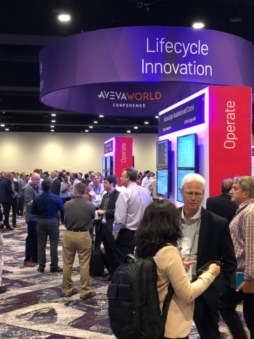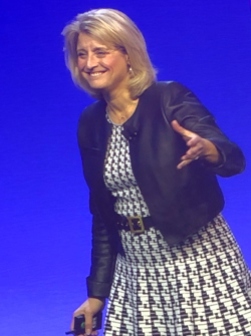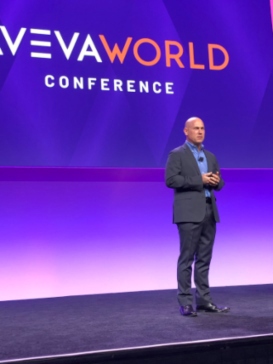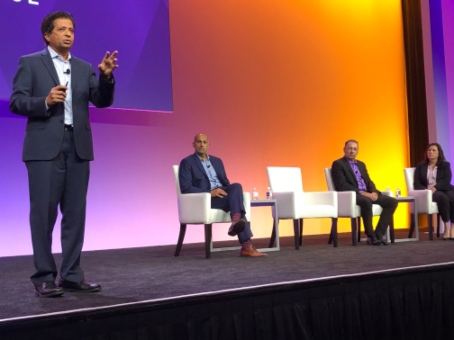AVEVA World Conference – Accelerating technical innovation

The AVEVA World Conference-North America opened this week in Orlando, Florida. With the theme of “Accelerate technical innovation, transform your team's future,” the event runs November 11-14 and provides more than 1,200 attendees with an immersive experience to explore the digital technologies that are shaping today's industrial businesses.
The event’s mission is to harness digital insight to enable people, businesses and the planet to thrive. Over the four-day event, industry practitioners from 16 industry verticals will come together to network, learn from each other and share ideas that drive forward the digital transformation agenda.
The conference also delivers an unmatched opportunity to share ideas and collaborate on strategies for making more-informed, more-timely and more impactful decisions for operations.
This event features sessions that provide strategies to boost team flexibility, agility and the ability to optimize complete end-to-end operational cycle, as well as in-depth, instructor-led training that covers best practices for developing solutions that can be applied to specific business needs.
Live technical demonstrations, peer-to-peer networking opportunities, success story sharing, and interaction with subject matter experts are also part of the extensive program. More than 150 presentations include tracks on upstream and downstream energy, chemicals, power, water processing, and metals and mining, among others.
Numerous technical sessions featured subjects across a broad spectrum of industries, such as, “Maximize return on investment from capital project to operations,” “Leveraging digital transformation to improve operational efficiency,” “Asset performance management: A positive difference for safety, reliability and employees,” “Predictive and beyond: Using AI to increase productivity,” and “Digitally transform the oil and gas midstream pipeline.”
Additionally, an in-depth Expo allowed AVEVA and other companies demo products and solutions.
Supporting the digital transformation journey. Pivotal technologies like cloud computing, the Industrial Internet of Things (IIoT), artificial intelligence, and augmented and virtual reality, are transforming traditional industrial operations. By bringing together previously inaccessible data streams, organizations can improve their performance by:
- Reducing unscheduled downtime
- Improving regulatory compliance and safety
- Integrating supply chain logistics with customer operations
- Optimizing maintenance strategies and increase overall equipment effectiveness
- Enhancing situational awareness throughout the enterprise
- Reducing waste.
Opening session and keynote. Tuesday morning’s opening plenary session began with a welcome from Steen Lomholt-Thomsen, Chief Revenue Officer for AVEVA.
“It’s great to have you here to learn more about the exciting technologies that we have to offer,” Lomholt-Thomsen said. “You are the key components for this to be a success. It takes creativity to implement transformation, and that comes from people. We have a collective vision of what we can accomplish on our digitalization journey. We share the goal of unlocking digital technologies in the industrial world.”
Keynote: Killing complexity. The highlight of the conference’s opening session was an inspiring keynote by Lisa Bodell, CEO of FutureThink. Bodell offered a roadmap to eradicate the workplace complexity that is killing organizations’ ability to be agile, fast and innovative.
“I want you to stop doing the unnecessary things so you can focus on the more meaningful work,” Bodell began in front of a capacity crowd. “That’s an improvement on how we live our lives and how we work every day.” When she asked the crowd of they would like more simplicity in their work, every hand in the audience was raised.
“You have more control over it than you think. You have to have a mindset that you want to simplify. We say that we want to simplify, but do we? Often, we create the complexity that we become slaves to.”
Bodell asserted that she believes that complexity is destroying companies. She quoted an SAP study of CEOs, and more than 75% said that complexity was their number one concern. “Complexity is not just about inefficiency. It holds you back from doing the things that really matter: driving growth, creating value and being more innovative.”
Bodell reached back in time for an example of how to increase complexity and wreak havoc in an organization. She referred to the Office of Strategic Services (OSS), the precursor to the CIA, in WWII. She cited their field manual and said that their tactics to disrupt Axis operations are just as relevant in today’s business world. “How do you infiltrate organizations and slow them to a halt?”
- Insist on doing everything through proper channels always.
- Refer all matters to committees.
- Refer back to matters that have already been decided upon and open them up for further discussion.
- Delay all decision making.
- Give long speeches.
“Speed is greater than size,” Bodell said. “Being the biggest can last you for a while, but the real competitive advantage is speed. You can’t have speed and agility if you’re operating with complexity.”
“Most complexity is self-imposed and completely unnecessary. You have the control to change it. Science show us that we are more effective and focused, and achieve better outcomes, when we do one task at a time. We elevate everything to the same level of importance, and this is just not true. We have assumptions around the way we work that have to change.”
Bodell said that organizations value more vs. less. Most people are rewarded for doing more, rather than achieving value, and this creates complexity. “We get value from doing rather than thinking.”
How do companies tackle this problem and move toward simplicity? “You have to move to achieve it in little steps. You have to make time for the important work. It’s a cultural and ethical issue. Employees want to work on things that matter, and this increases loyalty, belief in management and retention,” Bodell said. “We should be upset when people waste our time. If you get the work right, you get the culture right.”
“To be able to spend more time on meaningful things, you must define what those are. ‘I’m going to meet with innovative partner X, or I’m going to explore breakthrough business models.’ You have to change and challenge your behavior.”

Lisa Bodell, CEO of FutureThink.
Day 2 keynote. Rob McGreevy, Chief Strategist Officer, AVEVA, kicked off Wednesday morning with an impactful presentation. “For us, digital transformation is changing the entire face of the industrial manufacturing and infrastructure markets. It’s also challenging and pushing us to examine the way we think about all aspects of what we do; how we design, engineer and construct critical assets; and how to design and engineer packing or production of products.

Rob McGreevy, Chief Strategist Officer, AVEVA
“We have to change the way we operate. We have to start looking at the entirety of the value chain. How do we change the way we optimize the performance reliability and maintenance of our facilities and assets?” McGreevy asked. “Those are some of the things that are driving digitalization for us.”
“You have to have transformative results. We can’t just chase shiny objects; there must be a value attached to everything we do. One of the headlines across the board for AVEVA and our customers is sustainability – reducing energy consumption, creating more sustainable products and operating in a more responsible way.”
Panel. The Summit’s second day began with a panel that featured: Amish Sabharwal, Global Head of Engineering, AVEVA; Rashesh Mody, Head of Monitoring and Control; Harpreet Gulati, Head of Planning and Operations Business Unit, AVEVA; and Kim Custeau, Global Asset Performance Management Lead, AVEVA.

Wednesday morning's plenary panel (left to right): Rashesh Mody, Head of Monitoring and Control; Amish Sabharwal, Global Head of Engineering, AVEVA; Harpreet Gulati, Head of Planning and Operations Business Unit, AVEVA; and Kim Custeau, Global Asset Performance Management Lead, AVEVA.
Each of these subject matter experts took time to detail their ongoing efforts in digitalization.
“We see three major challenges with engineering,” said Sabharwal. “Within operations, our owners are struggling to find trusted engineering information – you’ve told us that this takes about 50% of your day, whether it’s PNIDs, drawings or data sheets. Getting the information from contractors, EPCs or supply chain can cost almost 4% of unbudgeted costs on a capital project. Finally, about 75% of big projects are more than 40% over budget. This are big challenges.
“The good news is that you are achieving results in knocking down these challenges using digitalization. Our portfolio is helping you to achieve these results, driving low-cost, faster capital projects, and mitigating capital risk,” Sabharwal said.
Rashesh Mody took the stage next to discuss what AVEVA customers are looking for within the operational side of a facility’s lifecycle. Across multiple industries, Mody focused on four business imperatives.
- Improve operational management, performance and efficiency
- Improve enterprise visibility, including context between data and connection between departments/business segments
- Improve agility, allowing the ability to change or customize products or processes without too much re-engineering
- Collaboration, which is becoming more and more important.
“We have completely revamped and improved our portfolio to meet these needs,” Mody said.
“At the end of the day, why do we build plants? To generate value,” said Harpreet Gulati. “What is stopping us? Today, there is a legacy of point solutions, manual processes all over the place, and the enterprise is not able to see everything working together. If we can connect these dots, there is a potential to reduce costs by 30% and improve margins by up to 20%.”
“Our mission is to enable our customers to capture that value by eliminating manual processes and silos, by connecting all of these things across the value chain and enabling workers to capture that value.”
“A critical component of the value chain is the connected worker,” he said. “This worker is increasingly mobile. We are providing new mobile apps that allows you to define the workflow to encourage collaboration to improve processes.”
Kim Custeau closed out the discussion with a focus on asset performance. “What are we trying to do with asset performance management (APM) is really rather simple. For us, it’s really about imagining a plant, refinery or facility with zero unplanned downtime. That’s where the value comes.”
“With our technology and expertise, we enable you to detect anomalies early, allow you time to investigate and take control of your asset performance,” Custeau said.
“It’s our job to tie together engineering, operations and maintenance using technology to enable decision support across the entire spectrum.” Focusing on APM, Custeau focused on different aspects.
- Strategy – Digital transformation programs allow companies to take what’s already digitized, digitize it more, tie it together, infuse it with artificial intelligence (AI) to make better decisions faster with things not visible in a silo. What are the goals/corporate objectives and how do assets have to perform to reach those objectives? This is an important step because it helps with ROI calculations.
- Information – How do we take the information, take a new problem we are going to solve around downtime and asset performance, and use that data in a way that no one else can? “We need to use analytics to help an operator access the information needed and make the correct and safe choices.”
- Execution – “A lot of products can identify an anomaly through machine learning,” Custeau said. “But that’s not the end of it. When you identify a potential failure or problem, you need to know what to do. That’s where you can close the loop and get the value.”
“We have applications that allow us to serve everyone, to collaborate workflow, to be mobile and to visualize. These are all threads across these domains, which will blur. The information will become available, and that makes everyone in this room stronger,” Custeau concluded.
NOTE: AVEVA recently achieved special recognition at Hydrocarbon Processing’s 2019 HP Awards: Best Digital Twin/Operator Training Technology—ROMeo Process Optimization, AVEVA; and Best Process/Plant Operations Optimization Technology—Unified Operations Center, AVEVA.
For more information, visit https://www.hydrocarbonprocessing.com/news/2019/11/hydrocarbon-processing-award-2019-winners-honored-at-houston-gala
CUTLINES
FIG. 1. The Expo featured the latest products and technologies.
FIG. 2. Lisa Bodell, CEO of FutureThink.






Comments